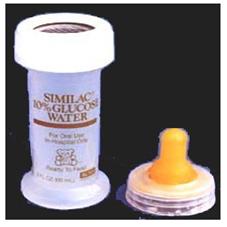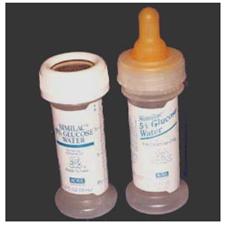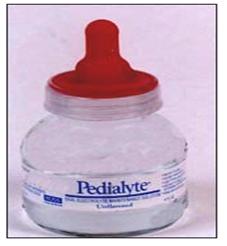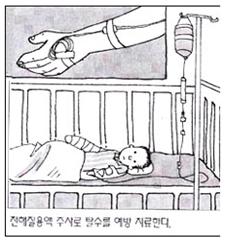신생아 탈수 열, Dehydration fever in newborn infants
| 신생아 탈수 열의 원인 |
- 감염병도 없고 열나게 하는 다른 병도 없는데 생후 신생아가 수분을 충분히 섭취하지 못해 탈수가 되고 그 탈수로 인해 미열 내지 고열이 날 수 있다.
- 이렇게 나는 열을 신생아 탈수 열이라고 한다.
- 이 탈수 열은 생후 2~3일경에 나는 것이 보통이다.
- 탈수 열은 어떤 신생아에게도 생길 수 있지만 모유를 먹는 신생아에게 더 잘 생긴다.
- [부모도 반의사가 되어야 한다- 소아가정간호 백과]-제 21권 소아청소년을 위한 가정간호-고열이 날 때, 체온,
- 신생아가 열이 날 때,
- 미숙아 체온 조절,
- 신생아가 열이 나면 어떻게 하나요, 열이 날 때 참조.
| 신생아 탈수 열의 증상 징후 |
- 생후 첫 2~3일 동안 대부분의 수유모들은 갓 난 아기가 필요로 하는 양의 젖을 충분히 분비할 수 없다(아마도 그 현상은 정상일 것이다).
- 모유가 충분히 분비되지 않거나 그 외 다른 이유로 모유나 인공영양을 충분히 먹을 수 없는 신생아는 탈수될 수 있다.
- 이 경우, 신생아에게 생긴 탈수로 열이 날 수 있다.
- 온도가 정상 이상으로 높은 실내나 보육기 내 신생아가 탈수되고 그로 탈수 열이 생길 수 있다.
- 탈수 열이 있는 아기는 보채고 불안하고 심장 박동이 빨라지고 숨결이 빨라지는 것이 보통이다.
- 그런 증상 징후가 있지만 많이 아파보이지 않는다.
- 이런 아기에게 끓여 식힌 맹물이나 5% 포도당 액, 또는 인공영양을 먹이면 갈증이 난 듯이 급히 잘 빨아먹는 것을 본다.
- 탈수 열이 있는 신생아에게 맹물이나 5% 포도당물 등을 충분히 먹인 후 미열이나 고열은 곧 떨어져 정상 체온으로 돌아가는 것이 보통이다.
- 고열이 있는 데도 그렇게 많이 아픈 것처럼 보이지 않는 것이 신생아 탈수 열의 특이한 증상 징후이다.
| 신생아 탈수 열의 진단 |
- 병력 증상 징후 진찰소견 등을 종합해서 진단한다.
- 신생아가 생명에 위험한 감염병을 앓을 때도 탈수 열이 있을 때처럼 미열이나 고열이 날 수 있다. 그 때문에 확실한 진찰 진단을 받지 않고 탈수 열이 난다고 조급하게 진단해서는 안 된다.
| 신생아 탈수 열의 치료 |
- 모유를 먹는 신생아에게 탈수 열이 생기면 모유를 계속 먹여도 된다.
- 아기에게 젖을 충분히 먹이기 위해 수유모는 정신적으로 육체적으로 휴식을 충분히 취하고 음식물을 충분히 섭취해야 한다.
- 5% 포도당 물이나 끓여서 식힌 무균수(살균 수)을 2~ 3시간마다 많이 먹이면 탈수 열은 곧 떨어지는 것이 보통이다.
- 인공영양을 먹는 신생아에게 탈수 열이 생기면 보통 때와 같이 계속 인공영양을 먹여도 된다. 실내온도나 보육기 내 온도를 적당히 조절하고 너무 덥지 않게 옷을 입히고 덮어준다.

사진 113.탈수되고 열이 나면 신생아용 포도당 액을먹인다.
Copyright ⓒ 2013 John Sangwon Lee, M.D., FAAP

사진 114.탈수되고 열이 나면 신생아용 포도당 액을 먹일 수 있다.
Copyright ⓒ 2013 John Sangwon Lee, M.D., FAAP

사진 115. 페디아라이트(Pedialyte, Ross 회사) 등 경구용 포도당 전해질 용액으로 탈수를 가수화 치료할 때도 있다.
Copyright ⓒ 2013 John Sangwon Lee, MD., FAAP

그림 116. 정맥 혈관용 포도당 전해질 용액으로 급성 탈수를 가수화 치료할 수 있다.
Copyright ⓒ 2013 John Sangwon Lee, MD ., FAAP
Dehydration fever in newborn infants 신생아 탈수 열
Causes of dehydration fever in newborns
- There are no infectious diseases and there are no other diseases that cause fever.
- After birth, newborns do not drink enough fluids and become dehydrated, and the dehydration may result in mild or high fever.
- This is what I call newborn dehydration fever.
- This dehydration fever usually occurs around 2 to 3 days of age.
- Dehydration fever can occur in any newborn, but it is more prevalent in breastfed newborns.
- [Parents should also be at least the half-doctors-Encyclopedia of Child and Family Nursing]-Volume 21 Family nursing for children and adolescents- When you have a high fever, your body temperature,
- When a newborn has a fever, regulating the body temperature of premature babies, What to do if your newborn has a fever, see When your baby Have a Fever.
Signs, symptoms of dehydration fever in newborns
- During the first two to three days of life, most nursing mothers cannot produce enough milk for their newborn baby (probably that’s normal).
- Newborns who do not produce enough milk or for other reasons who cannot consume enough breast milk or artificial nutrition can become dehydrated. In this case, dehydration in the newborn can lead to fever.
- Dehydration of newborns in rooms or incubators where the temperature is higher than normal may result in dehydration fever.
- Babies with dehydration fever usually feel fluffed and anxious, have a faster heart rate and faster breath.
- There are signs of such symptoms, but they don’t seem to hurt much. If you feed these babies with boiled cold water, 5% glucose solution, or artificial nutrients, you can see them suck up well as if they were thirsty. It is common for newborns with dehydration fever to return to normal body temperature immediately after feeding enough plain water or 5% glucose.
- Having a high fever but not appearing to be so ill is a peculiar symptom of a newborn’s dehydration fever.
Diagnosis of dehydration fever in newborns
- Comprehensive diagnosis including medical history, symptoms, signs, and examination findings. Even when a newborn has a life-threatening infectious disease, it can be mild or high fever, just like when you have a dehydration fever.
- For this reason, you should not be rushed to diagnose dehydration fever without receiving a definite medical examination.
Treatment of dehydration fever in newborns
- If a breastfed newborn develops a fever of dehydration, it is okay to continue breastfeeding.
- In order to fully breastfeed the baby, nursing mothers need to get enough rest mentally and physically and eat enough food. If you feed a lot of 5% glucose water or boiled and cooled sterile water (sterilized water) every 2 to 3 hours, the heat of dehydration will drop soon.
- If newborns who are fed artificial nutrition develop dehydration fever, they may continue to receive artificial nutrition as usual.
- Adjust the room temperature or the temperature inside the incubator appropriately, and dress and cover it so that it is not too hot.

Picture 113: When dehydrated and feverish, the newborn is given a glucose solution for newborns. Copyright ⓒ 2013 John Sangwon Lee, M.D., FAAP

Picture 114: If your baby is dehydrated and has a fever, you can feed the newborn’s glucose solution. Copyright ⓒ 2013 John Sangwon Lee, M.D., FAAP

Photo 115. Sometimes hydrolysis treatment of dehydration is performed with oral glucose electrolyte solutions such as Pedialyte (Ross company). Copyright ⓒ 2013 John Sangwon Lee, MD., FAAP

- Figure 116. Hydrolyzed treatment of acute dehydration with glucose electrolyte solutions for venous vessels. Copyright ⓒ 2013 John Sangwon Lee, MD ., FAAP
출처 및 참조 문헌
- www.drleepediatrics.com 제1권 소아청소년 응급 의료
- www.drleepediatrics.com 제2권 소아청소년 예방
- www.drleepediatrics.com 제3권 소아청소년 성장 발육 육아
- www.drleepediatrics.com 제4권 모유,모유수유, 이유
- www.drleepediatrics.com 제5권 인공영양, 우유, 이유식, 비타민, 미네랄, 단백질, 탄수화물, 지방
- www.drleepediatrics.com 제6권 신생아 성장 발육 육아 질병
- www.drleepediatrics.com제7권 소아청소년 감염병
- www.drleepediatrics.com제8권 소아청소년 호흡기 질환
- www.drleepediatrics.com제9권 소아청소년 소화기 질환
- www.drleepediatrics.com제10권. 소아청소년 신장 비뇨 생식기 질환
- www.drleepediatrics.com제11권. 소아청소년 심장 혈관계 질환
- www.drleepediatrics.com제12권. 소아청소년 신경 정신 질환, 행동 수면 문제
- www.drleepediatrics.com제13권. 소아청소년 혈액, 림프, 종양 질환
- www.drleepediatrics.com제14권. 소아청소년 내분비, 유전, 염색체, 대사, 희귀병
- www.drleepediatrics.com제15권. 소아청소년 알레르기, 자가 면역질환
- www.drleepediatrics.com제16권. 소아청소년 정형외과 질환
- www.drleepediatrics.com제17권. 소아청소년 피부 질환
- www.drleepediatrics.com제18권. 소아청소년 이비인후(귀 코 인두 후두) 질환
- www.drleepediatrics.com제19권. 소아청소년 안과 (눈)질환
- www.drleepediatrics.com 제20권 소아청소년 이 (치아)질환
- www.drleepediatrics.com 제21권 소아청소년 가정 학교 간호
- www.drleepediatrics.com 제22권 아들 딸 이렇게 사랑해 키우세요
- www.drleepediatrics.com 제23권 사춘기 아이들의 성장 발육 질병
- www.drleepediatrics.com 제24권 소아청소년 성교육
- www.drleepediatrics.com 제25권 임신, 분만, 출산, 신생아 돌보기
- Red book 29th-31st edition 2021
- Nelson Text Book of Pediatrics 19th- 21st Edition
- The Johns Hopkins Hospital, The Harriet Lane Handbook, 22nd edition
- 응급환자관리 정담미디어
- Pediatric Nutritional Handbook American Academy of Pediatrics
- 소아가정간호백과–부모도 반의사가 되어야 한다, 이상원 저
- The pregnancy Bible. By Joan stone, MD. Keith Eddleman, MD
- Neonatology Jeffrey J. Pomerance, C. Joan Richardson
- Preparation for Birth. Beverly Savage and Dianna Smith
- 임신에서 신생아 돌보기까지. 이상원
- Breastfeeding. by Ruth Lawrence and Robert Lawrence
- Sources and references on Growth, Development, Cares, and Diseases of Newborn Infants
- Emergency Medical Service for Children, By Ross Lab. May 1989. p.10
- Emergency care, Harvey Grant and Robert Murray
- Emergency Care Transportation of Sick and Injured American Academy of Orthopaedic Surgeons
- Emergency Pediatrics A Guide to Ambulatory Care, Roger M. Barkin, Peter Rosen
- Quick Reference To Pediatric Emergencies, Delmer J. Pascoe, M.D., Moses Grossman, M.D. with 26 contributors
- Neonatal resuscitation Ameican academy of pediatrics
- Pediatric Nutritional Handbook American Academy of Pediatrics
- Pediatric Resuscitation Pediatric Clinics of North America, Stephen M. Schexnayder, M.D.
-
Pediatric Critical Care, Pediatric Clinics of North America, James P. Orlowski, M.D.
-
Preparation for Birth. Beverly Savage and Dianna Smith
-
Infectious disease of children, Saul Krugman, Samuel L Katz, Ann A.
- 제4권 모유, 모유수유, 이유 참조문헌 및 출처
- 제5권 인공영양, 우유, 이유, 비타민, 단백질, 지방 탄수 화물 참조문헌 및 출처
- 제6권 신생아 성장발육 양호 질병 참조문헌 및 출처
- 소아과학 대한교과서
-
Copyright ⓒ 2015 John Sangwon Lee, MD., FAAP
미국 소아과 전문의, 한국 소아청소년과 전문의 이상원 저 “부모도 반의사가 되어야 한다”-내용은 여러분들의 의사로부터 얻은 정보와 진료를 대신할 수 없습니다.
The information contained in this publication should not be used as a substitute for the medical care and advice of your doctor. There may be variations in treatment that your doctor may recommend based on individual facts and circumstances. “Parental education is the best medicine.”